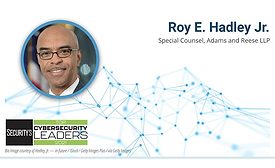Cybersecurity
Special Report
2021 Top Cybersecurity Leaders - Roy E. Hadley Jr.
Special Counsel, Adams and Reese LLP
February 1, 2021
Sign-up to receive top management & result-driven techniques in the industry.
Join over 20,000+ industry leaders who receive our premium content.
SIGN UP TODAY!Copyright ©2025. All Rights Reserved BNP Media.
Design, CMS, Hosting & Web Development :: ePublishing










